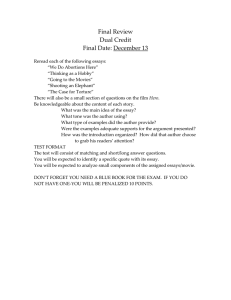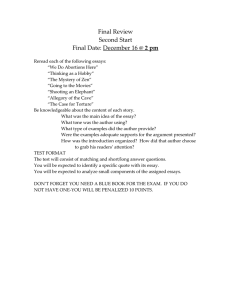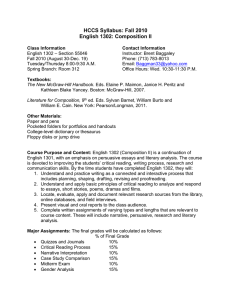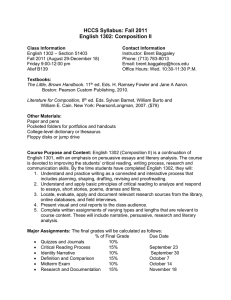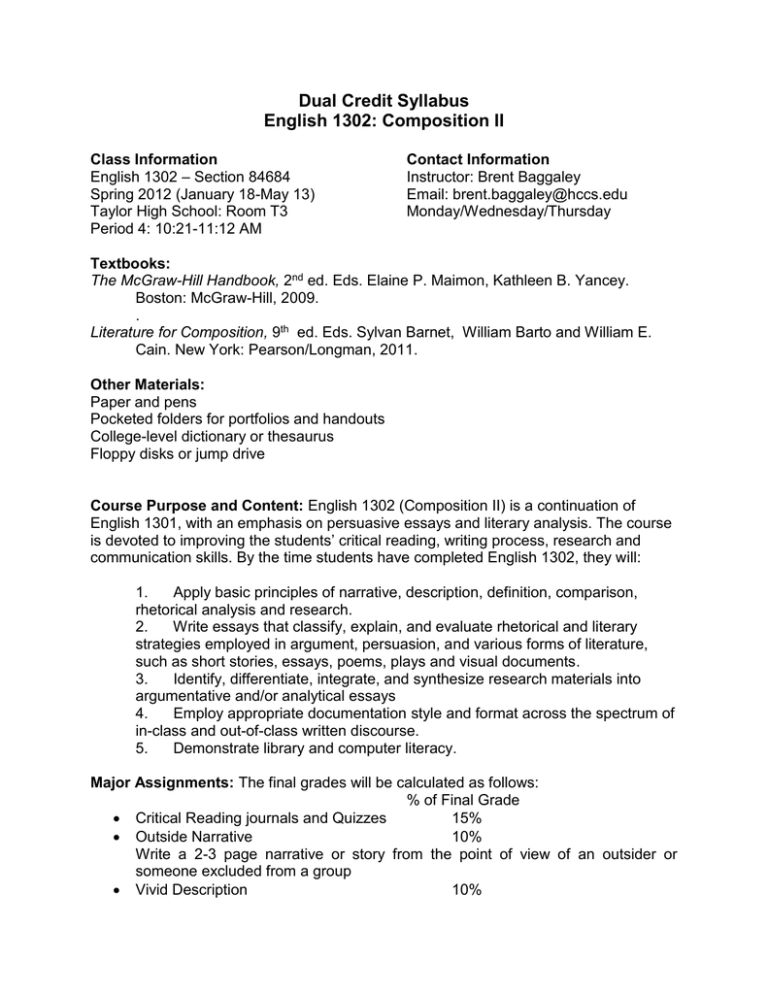
Dual Credit Syllabus
English 1302: Composition II
Class Information
English 1302 – Section 84684
Spring 2012 (January 18-May 13)
Taylor High School: Room T3
Period 4: 10:21-11:12 AM
Contact Information
Instructor: Brent Baggaley
Email: brent.baggaley@hccs.edu
Monday/Wednesday/Thursday
Textbooks:
The McGraw-Hill Handbook, 2nd ed. Eds. Elaine P. Maimon, Kathleen B. Yancey.
Boston: McGraw-Hill, 2009.
.
Literature for Composition, 9th ed. Eds. Sylvan Barnet, William Barto and William E.
Cain. New York: Pearson/Longman, 2011.
Other Materials:
Paper and pens
Pocketed folders for portfolios and handouts
College-level dictionary or thesaurus
Floppy disks or jump drive
Course Purpose and Content: English 1302 (Composition II) is a continuation of
English 1301, with an emphasis on persuasive essays and literary analysis. The course
is devoted to improving the students’ critical reading, writing process, research and
communication skills. By the time students have completed English 1302, they will:
1.
Apply basic principles of narrative, description, definition, comparison,
rhetorical analysis and research.
2.
Write essays that classify, explain, and evaluate rhetorical and literary
strategies employed in argument, persuasion, and various forms of literature,
such as short stories, essays, poems, plays and visual documents.
3.
Identify, differentiate, integrate, and synthesize research materials into
argumentative and/or analytical essays
4.
Employ appropriate documentation style and format across the spectrum of
in-class and out-of-class written discourse.
5.
Demonstrate library and computer literacy.
Major Assignments: The final grades will be calculated as follows:
% of Final Grade
Critical Reading journals and Quizzes
15%
Outside Narrative
10%
Write a 2-3 page narrative or story from the point of view of an outsider or
someone excluded from a group
Vivid Description
10%
Write a 1-2 page vivid description of a place, event or activity
Explore Definitions
15%
Write a 3-4 page reflective essay that researches and compares different
definitions or points of view on an idea or concept.
Midterm Exam
10%
Multiple Choice and in-class Comparison essay
Rhetorical Analysis
15%
Write a 4-5 page critical analysis of the arguments, assumptions and rhetorical
strategies in a play, story or essay.
Research Project
15%
Write a 5-6 page (plus MLA Works Cited) Research paper
Final Exam
10%
Multiple Choice and In-class essay
Course Goals and Skills:
· READING: Reading material at the college level means having the ability to analyze
and interpret a variety of materials -- books, articles, and documents.
· WRITING: Writing at the college level means having the ability to produce clear,
correct, and coherent prose adapted to purpose, occasion, and audience. In addition
to knowing correct grammar, spelling, and punctuation, students should also
become familiar with the writing process, including how to discover a topic, how to
develop and organize it, and how to phrase it effectively for their audience. These
abilities are acquired through practice and reflection.
· SPEAKING: Effective speaking is the ability to communicate orally in clear,
coherent, and persuasive language appropriate to purpose, occasion, and audience.
· LISTENING: Listening at the college level means the ability to analyze and interpret
various forms of spoken communication.
· CRITICAL THINKING: Critical thinking embraces methods of applying both
qualitative and quantitative skills analytically and creatively to subject matter in order
to evaluate arguments and to construct alternative strategies. Problem solving is one
of the applications of critical thinking used to address an identified task.
· COMPUTER LITERACY: Computer literacy at the college level means having the
ability to use computer-based technology in communicating, solving problems, and
acquiring information. Core-educated students should have an understanding of the
limits, problems, and possibilities associated with the use of technology and should
have the tools necessary to evaluate and learn new technologies as they become
available.
II. EXEMPLARY EDUCATIONAL OBJECTIVES: ENGLISH 1302
By the time they have completed English 1302, students will
• demonstrate the ability to use consistently and effectively the writing process for both
in-class and out-of-class essays (thus reinforcing English 1301 instruction);
• understand and apply the basic principles of critical thinking—evaluation, analysis,
and synthesis— as they write essays that persuade or argue;
• be able to analyze, in writing, readings by professional and student writers (for such
elements as purpose, audience tone, style, writing strategy, and for much deeper
meanings);
• be able to develop a critical and creative essay in response to an issue related to
reading(s) or other class projects;
• demonstrate the ability to resist simplistic formulations, whether in their own or others’
texts;
• understand the characteristics of imaginative texts and write effective analyses of
various genres;
• be able to acknowledge, as appropriate, their own history, interests, and biases as
they discuss a topic, thus placing themselves credibly in the discussion;
• develop the ability to research and write a documented paper;
• make effective stylistic choices (diction, tone, sentence structure) in all writing
assignments, depending upon the audience and purpose of a piece of writing;
• apply suggestions, as appropriate, from evaluated compositions to other writing tasks;
and
• fulfill the writing requirements of the course, writing at least 6000 words during the
semester.
Grading Scale: Essays and exams will be scored on a rubric of 1-10, “10” being the
highest score, and “1” the lowest. For the purposes of grade calculation, an average
score of 9-10 will earn an A, 7-8 a B, 5-6 a C, 3-4 a D, and anything below, an F.
Students will be provided with the rubric of criteria ahead of time.
Attendance Policy: Regular Attendance is required at Houston Community College.
HCCS class policy states that a student who is absent for more than 12.5% (6 hours) of
class may be administratively dropped. Students who intend to withdraw from a course
must do so by the official date or they may receive an F instead of a W. Attendance will
be taken every class period and this policy will be enforced. Students who are more
than 10 minutes late for class will not be allowed into the classroom, and will be marked
as absent.
Policy on Academic Dishonesty: Scholastic dishonesty includes, but is not limited to:
Plagiarism: the appropriation of another person’s work, and the unacknowledged
(without MLA or APA documentation) incorporation of that work into one’s own
work for credit.
Collusion: the unauthorized collaboration with another person, whether from the
class or from the internet, in preparing written work for credit.
A student guilty of a first offense will receive a grade of 0 on the assignment involved.
For a second offense, the student will receive an F for the course.
Cell Phone Policy: All cell phones and other electronic devices are to be turned off
while in class, unless permitted by the instructor.
This Syllabus, and all other calendars, assignment sheets and handouts can be found
on the Learning Web page. Go to www.hccs.edu.
Spring 2012 Calendar: Week 1-3
Composition II
Week 1
Wednesday, January 18
Introduction and Orientation
Review Syllabus on Learning Web
Assignment: Buy textbooks at Katy HCCS campus bookstore: Literature for Composition and
The McGraw-Hill Handbook
Print and bring in Syllabus from Learning Web
Thursday, January 19
Review and take quiz on Syllabus
Review textbooks and Rhetorical Modes: Narrative and Description
Assignment: Read McGraw 62-71 and Literature 11-20
Week 2
Monday, January 23
Discuss Description essay and Critical Reading Process
Read and begin Critical Reading of “Ripe Figs” 11-12 and “There Will Come Soft Rains” 24-28
Assignment: Read LC 22-38, and “Senior Picture Day” 33-36
Wednesday, January 25
Discuss Outsider Narrative and brainstorm Description essay
Read and respond to “Senior Picture Day”
Assignment: Read “Salvation” 351-52, McGraw 42-50
Thursday, January 26
Take Multiple Choice quiz
Outline and write first draft of Description
Assignment: Bring in Description first draft. Read “The Necklace” 38-43 and “The Man Who was
Almost a Man” 757-65
Week 3
Monday, January 30
Revise and edit Descriptive journal Read McGraw 72-93
Critically Read and compare “The Necklace” and “Almost a Man”
Assignment: Bring in Description final draft and portfolio
Wednesday, February 1
Turn in Descriptive portfolio
Play “Worst Person in the World” game
Brainstorm Outsider Narrative
Assignment: Read identity poems (LC 1104-16)
Thursday, February 2
Take Quiz on Poems and stories
Begin Outsider Narrative essay
Assignment: Read “Two Kinds” 1079-86 and “Everyday Use” 1087-92

